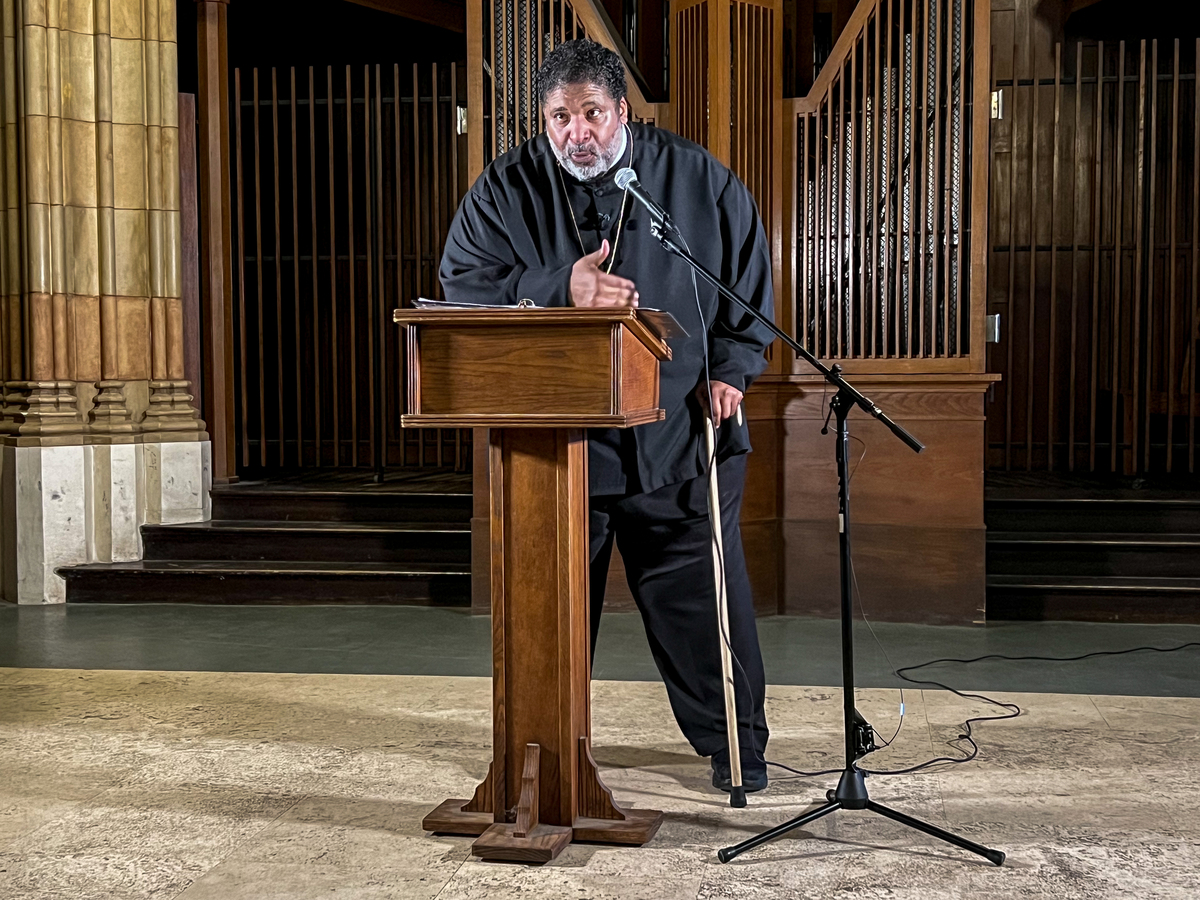Reverend Dr. William J. Barber II speaks at YDS as Curran Distinguished Mentor
Rev. Dr. Barber II delivered a speech that reiterated his life’s work as a social justice activist, pastor and Yale professor.

Brooklyn Brauner., Contributing Photographer
In a speech on April 4, activist Reverend Dr. William J. Barber II reiterated the sentiments Martin Luther King Jr. presented when he proclaimed years ago in his “I Have a Dream Speech” that the necessary changes surrounding racial equality still had yet to appear. Barber explained that King was publicly mourning the future that so many African Americans desired.
On April 4, as a part of this year’s Curran Distinguished Mentor Program — which invites leaders who have contributed to public service and social justice to mentor Yale students — Barber, a professor at the Yale Divinity School, spoke at Dwight Hall Chapel about collective action and advocating for justice with an intergenerational approach. The Curran Distinguished Mentor Program aims to provide students with insight and guidance by highlighting individuals who embody Dwight Hall’s mission of public service.
“King did not lay down his life; he was murdered,” Barber said. “His life was stolen, not given.”
His speech commemorated the legacy of Martin Luther King Jr. upon the date marking his assassination. However, despite the numerous references to King’s work, Barber was adamant to not refer to the day as an anniversary of his “untimely death.” Barber emphasized that King was willing to die to tell the truth in an “era of lies,” pleading eternal dissatisfaction with injustice.
It was in a similar vein that New Haven resident and retired Hillhouse High School teacher, Robert Gibson, drew a comparison between the two social justice activists.
“I have a high regard and esteem for Reverend Barber, and I see him in many ways as another Martin Luther King because of his fight for equality,” Gibson told the News. “He has taken on that mantle to be a voice for justice in America.”
Barber, who is the founding director of the new Center for Public Theology and Public Policy, works to deliver a moral call for action at Yale College. As a social justice activist, pastor and professor, he speaks frequently on the transformative power of movement building.
Rosalyn Woodward Pelles, the assistant director for student engagement of the Center for Public Theology and Public Policy, spoke further about the mission of the event and the work of the program.
“We seek to take the movement we have made, institutionalize it and then share the lessons with the students at Yale College,” Pelles told the News.
Above all else, Barber urged the audience to wrestle with the meaning and possibilities of the “common ground” that lies beneath society’s many differences, collectively striving towards mutually-beneficial goals.
To contextualize the urgency and scope of the issues to which he referred, including wage stagnation, Barber said that 700 people a day die from poverty in the United States alone, a fact that is not often reported or recognized by “the major media conglomerates.”
More specifically, he talked about poverty statistics from Connecticut, where 391,000 residents participate in food stamps, approximately 218,000 people live uninsured and 11 percent of the census-reported population is at risk of not being able to afford clean water.
Barber explained that it took 400 years from the onset of slavery till now to raise the minimum wage to $7.25, which he said is still not a liveable wage.
“How much more patience are they supposed to have when they have yet to receive a livable wage?” he asked, referring to the 37.9 million people living below the poverty line according to the United States Census Bureau. “Don’t ask how much it will cost to change, rather ask how much it is costing to remain the same.”
In his concluding remarks, Barber posed the rhetorical question “Is this generation going to be shut down?” After expanding upon the rising poverty rates and lack of effective action across the country, he asked the audience to contemplate when and if they were willing to fight.
“There have always been, and always will be, forces that want to shut down those who were rejected because of race, class or sexuality,” Barber said. “But when the rejected come together, they become each other’s cornerstones. The soul of our country is at stake, and it cannot be put together unless the rejected, hurt, left out and suffering individuals come together.”
In addition to his accolades on campus, Barber also serves as the president of Repairers of the Breach and co-chair of the Poor People’s Campaign: A National Call for Moral Revival.







